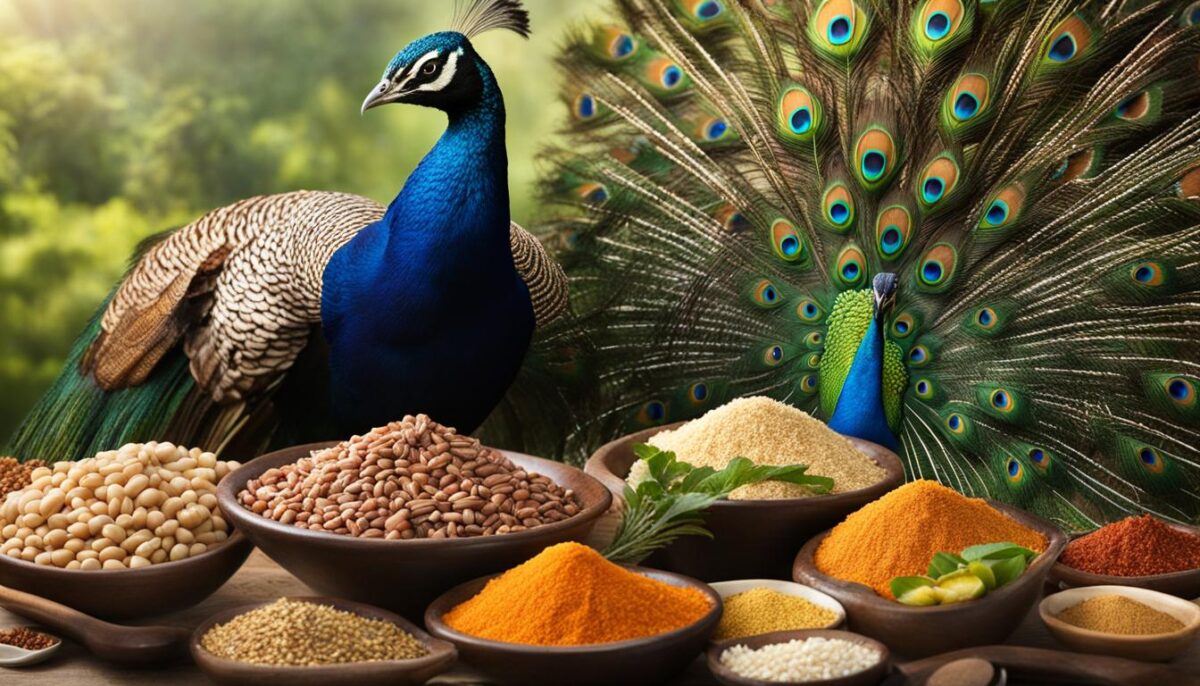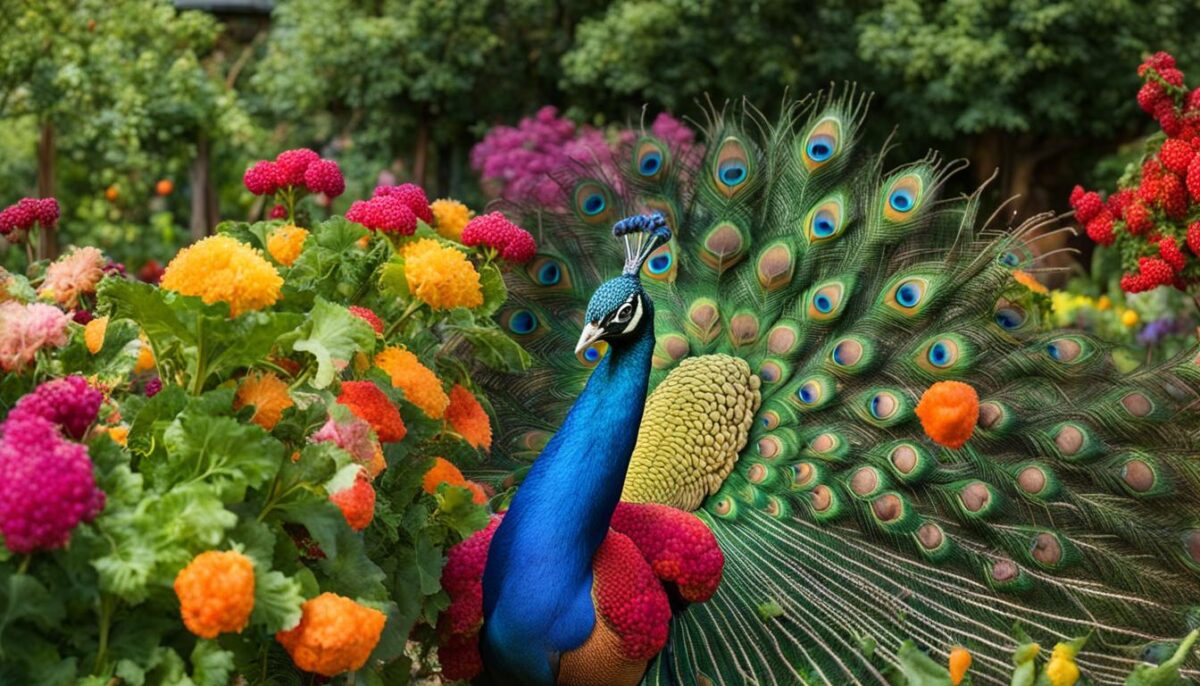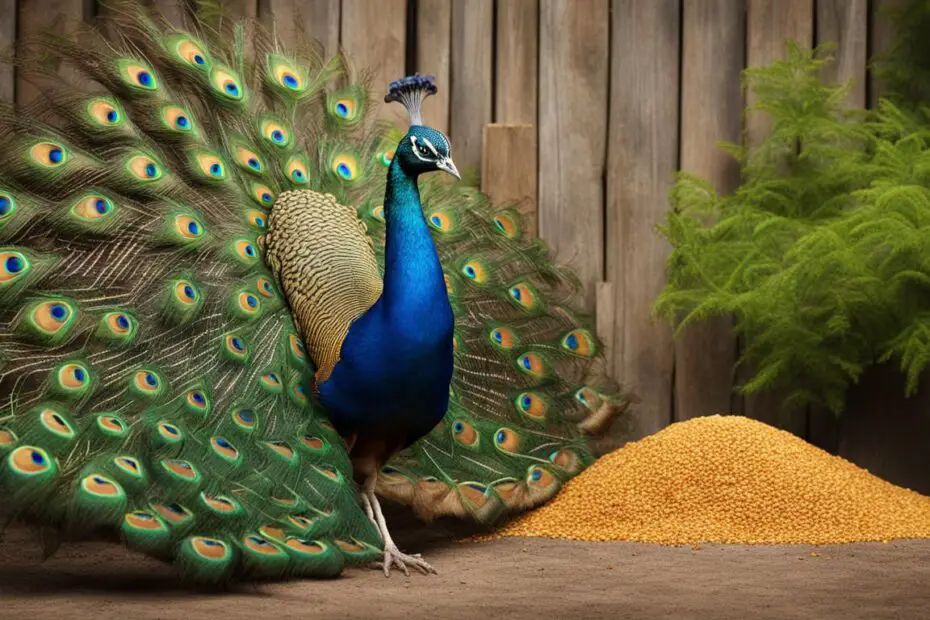Peacocks are beautiful and majestic birds known for their vibrant plumage. If you’re a peacock owner or simply fascinated by these stunning creatures, you may be wondering about their dietary needs. Can peacocks eat chicken feed? In this article, we’ll explore the peacock diet and why chicken feed may not be the best option for them.
Key Takeaways:
- Chicken feed does not provide the necessary nutrients for peacocks’ optimal health.
- Peacocks require a balanced diet that includes high protein and low-fat content.
- Formulated peacock feed, grains and seeds, vegetables and fruits, insects and insect larvae, and fermented grains are recommended for a peacock’s diet.
- Peacocks should not regularly eat chicken feed as it may cause malnutrition and health problems.
- If peacocks don’t have access to their regular food sources, they may consume small amounts of chicken feed in extreme circumstances, but it should not be their regular diet.
Peacocks Food Requirements
Feeding peacocks a proper diet is crucial for their overall health and well-being. These magnificent birds have specific food requirements that should be met to ensure optimal nutrition. Peacocks require a diet that is high in protein and low in fat, providing them with the necessary nutrients for growth, maintenance, and overall vitality.
A balanced peacock diet should consist of a variety of foods that meet their nutritional needs. This includes formulated peacock feed, which is specially designed to provide the ideal balance of protein, vitamins, and minerals. Grains and seeds are also an essential part of their diet, providing carbohydrates and additional nutrients.
In addition to these staple foods, peacocks can benefit from the inclusion of fresh vegetables and fruits, which offer vitamins and minerals that contribute to their overall health. Insects and insect larvae are an important source of protein, and fermented grains can provide added nutritional benefits.
By understanding and meeting the food requirements of peacocks, we can ensure that these majestic birds thrive in captivity and maintain their vibrant plumage, strong immune system, and overall well-being.
Nutritional Requirements for Peacocks
Peacocks have specific nutritional requirements that must be met to support their growth, development, and overall health. These requirements include:
- High Protein: Peacocks need a diet that is high in protein, as it is essential for their muscle development and feather growth.
- Low Fat: Peacocks should consume a diet that is low in fat to prevent obesity and related health issues.
- Essential Vitamins and Minerals: Peacocks require a balanced intake of vitamins and minerals to support their overall health and bodily functions.
- Calcium: Adequate calcium intake is necessary for the formation of strong bones and eggshells in female peacocks.
Meeting these nutritional requirements through a varied and balanced diet is essential for the well-being of peacocks in captivity.
| Food Item | Nutritional Benefits |
|---|---|
| Formulated Peacock Feed | Provides the ideal balance of protein, vitamins, and minerals for peacock health and growth. |
| Grains and Seeds | Rich in carbohydrates and additional nutrients for energy and overall nutrition. |
| Vegetables and Fruits | Offer vitamins and minerals that support peacock health and immune system function. |
| Insects and Insect Larvae | Provide a natural source of protein that is essential for muscle development and feather growth. |
| Fermented Grains | Enhance nutrition and digestion for peacocks, promoting overall health and well-being. |
By providing a well-rounded diet that includes these food items, peacock owners can ensure that their birds receive the necessary nutrition to thrive in captivity.
“Feeding peacocks a proper diet is crucial for their overall health and well-being.”
Peacocks’ Protein Requirements
Protein plays a crucial role in the diet of peacocks, as it supports their growth, development, and overall health. Adult male peacocks typically require around 25% protein, while female peacocks need slightly less. In the wild, peafowls fulfill their protein needs by consuming insects, worms, and small animals. However, in captivity, their diet often consists of pellets or crumbles made from poultry by-products and grains.

While chicken feed may contain a high protein content, it may not provide the ideal protein composition for peacocks. This is due to differences in their digestive system and specific nutritional requirements. Peacocks have unique dietary needs that differ from chickens, necessitating the consumption of foods with a balanced protein profile to ensure their optimal health.
The Importance of Balanced Protein Composition
Feeding peacocks chicken feed alone may lead to nutritional imbalances and deficiencies, negatively impacting their physical well-being.
A balanced protein composition is vital for peacocks to thrive. Consuming chicken feed as the sole source of protein may result in inadequate amino acid ratios, which can hinder their growth, feather development, and reproductive capabilities. Peacocks require a varied diet that provides an assortment of proteins from different sources to meet all their essential amino acid requirements.
Feeding peacocks a diet with optimal protein composition ensures their vitality and supports the vibrant display of their unique plumage. Providing a diverse range of protein-rich foods, such as insects, worms, and small animals, alongside a balanced formulated peacock feed, helps meet their nutritional needs and promotes their overall well-being.
Why Peacocks Should Not Regularly Eat Chicken Feed
Regularly feeding peacocks chicken feed can have detrimental effects on their overall health and well-being. Peacocks have specific nutritional requirements that differ from those of chickens, and relying solely on chicken feed may lead to nutritional deficiencies and health problems.
One of the main reasons why peacocks should not regularly consume chicken feed is that it does not provide the necessary nutrients required by these birds. Chicken feed is specifically formulated for the dietary needs of chickens, which have different nutritional requirements compared to peacocks. Peacocks require a higher calcium intake and a specific balance of vitamins and minerals to support their vibrant plumage and overall health.
Another important factor to consider is the protein composition of chicken feed. While chicken feed does contain protein, it may not provide the ideal protein balance and composition that peacocks need. Peacocks require a diet that is higher in protein compared to chickens, with adult males typically needing around 25% protein. Feeding them chicken feed as a regular part of their diet may result in inadequate protein intake, leading to malnutrition and health issues.
“Regularly feeding peacocks chicken feed can lead to nutritional deficiencies and health problems.”
Furthermore, peacocks have a unique digestive system that may not efficiently process and extract the necessary nutrients from chicken feed. Their digestive system is adapted to consuming a variety of foods in the wild, including insects, worms, and small animals. Feeding them a diet primarily consisting of chicken feed may not provide the same nutritional benefits as their natural prey, potentially compromising their overall health.
| Nutrient | Peacock Requirement | Chicken Feed Content |
|---|---|---|
| Protein | Higher requirement (around 25%) | Varies, may not provide adequate protein balance and composition |
| Calcium | Higher requirement | Lower calcium content |
| Vitamins and Minerals | Specific balance for plumage and overall health | May not provide optimal balance |
For these reasons, it is crucial to provide peacocks with a diet that meets their specific nutritional requirements. This includes formulated peacock feed, grains and seeds, vegetables and fruits, insects and insect larvae, and fermented grains. By offering a balanced and varied diet, peacocks can maintain optimal health, vibrant plumage, and a strong immune system.
Occasions When Peacocks Can Eat Chicken Feed
While it is not recommended for peacocks to regularly eat chicken feed, there may be occasions when they can consume small amounts. Extreme circumstances like natural disasters can disrupt peacocks’ regular food sources, leaving them with limited options. In such situations, peacocks may resort to eating chicken feed as a last resort to fulfill their hunger.
However, it is crucial to understand that chicken feed does not provide the necessary nutrients for peacocks’ optimal health. Peacocks have specific dietary requirements that include high protein and low fat content. Regular consumption of chicken feed can lead to nutritional deficiencies, malnutrition, and even health problems in the long run.
To ensure peacocks’ well-being, it is important to provide appropriate peacock feed as soon as possible after such circumstances. Formulated peacock feed, grains and seeds, vegetables and fruits, insects and insect larvae, and fermented grains should be the primary sources of nutrition for peacocks. These foods meet their protein, vitamin, and mineral requirements and support their overall health and longevity.
Table: Comparing Nutritional Composition of Chicken Feed and Ideal Peacock Feed
| Chicken Feed | Ideal Peacock Feed | |
|---|---|---|
| Protein Content | Varies (typically around 16-22%) | Formulated to meet peacock’s protein requirements (typically around 25%) |
| Fat Content | Varies (often higher compared to peacock feed) | Low fat content to maintain a healthy weight |
| Vitamin and Mineral Balance | May not provide the ideal balance for peacock’s needs | Formulated to meet peacock’s specific vitamin and mineral requirements |
| Calcium Content | Varies (may not provide sufficient calcium for peacock’s needs) | Contains adequate calcium for strong bones and eggshell production (for breeding pairs) |
What Can Peacocks Eat?
Peacocks have specific dietary requirements to ensure their optimal health and well-being. A balanced and varied diet is essential for their overall nutrition. Here are some of the best foods that peacocks can eat:
- Formulated Peacock Feed: This specially formulated feed provides the necessary nutrients, vitamins, and minerals that peacocks need. It is designed to meet their dietary requirements and support their growth and development.
- Grains and Seeds: Peacocks can enjoy a variety of grains and seeds, such as millet, corn, wheat, and sunflower seeds. These provide carbohydrates, fats, and fiber, which are important for their energy levels and digestion.
- Vegetables and Fruits: Peacocks can benefit from a range of vegetables and fruits, including leafy greens, carrots, peas, apples, and berries. These provide essential vitamins and minerals, as well as antioxidants that help boost their immune system.
- Insects and Insect Larvae: Peacocks are natural insect hunters and thrive on a diet that includes insects and insect larvae. This can include mealworms, crickets, and beetles, which are rich in protein and essential amino acids.
- Fermented Grains: Fermented grains, such as fermented corn or barley, can provide probiotics and promote healthy digestion in peacocks. These grains also help improve nutrient absorption and support a balanced gut microbiome.
It’s important to note that while peacocks can eat a variety of foods, it’s crucial to ensure that their diet is balanced and meets their nutritional needs. Providing a combination of these recommended food sources will help keep peacocks healthy and thriving in captivity.

Related posts:
Expand your knowledge on peacock diets and feeding guidelines by exploring these informative posts:
-
“Everything You Need to Know About Feeding Peacocks”
Discover the essential information about feeding peacocks, including their dietary requirements, recommended food sources, and feeding guidelines. Gain insights into how to provide a balanced diet for these beautiful birds to ensure their optimal health and well-being.
-
“Common Mistakes to Avoid When Feeding Peacocks”
Learn about the common pitfalls and mistakes that peacock owners should avoid when it comes to their diet. From improper food choices to overfeeding, this post highlights the key errors to steer clear of to maintain the overall health and longevity of your peacocks.
-
“The Importance of Proper Nutrition for Peacocks”
Gain a deeper understanding of why proper nutrition plays a vital role in the well-being of peacocks. Explore the impact of a balanced diet on their vibrant plumage, immune system, and overall quality of life. Discover the long-term benefits of providing your peacocks with the right nutrients.
-
“Tips for Creating a Balanced Diet for Your Peacock”
Find practical tips and strategies for creating a well-rounded, nutritious diet plan for your peacock. Learn how to incorporate the right proportions of formulated peacock feed, grains and seeds, vegetables and fruits, insects and insect larvae, and fermented grains. Enhance their diet and support their overall health and vitality.
Explore these posts to deepen your understanding of peacock diets, feeding guidelines, and the importance of providing the right nutrition to these magnificent birds.
| Post | Description |
|---|---|
| “Everything You Need to Know About Feeding Peacocks” | Learn about peacock dietary requirements, recommended food sources, and feeding guidelines. |
| “Common Mistakes to Avoid When Feeding Peacocks” | Discover the common errors to avoid when feeding peacocks to ensure their overall health and longevity. |
| “The Importance of Proper Nutrition for Peacocks” | Explore the significance of a balanced diet and its impact on peacocks’ plumage, immune system, and quality of life. |
| “Tips for Creating a Balanced Diet for Your Peacock” | Find practical tips and strategies for creating a nutritious diet plan to support your peacock’s health and vitality. |
Frequently Asked Questions (FAQs)
Here are some common questions about peacock diets and feeding guidelines:
Q: Can peacocks eat chicken feed as their primary food?
A: No, peacocks should not consume chicken feed as their regular diet. Chicken feed lacks the necessary nutrients required by peacocks and may lead to malnutrition and health issues.
Q: What should peacocks eat instead of chicken feed?
A: Peacocks should be fed a balanced diet that includes formulated peacock feed, grains and seeds, vegetables and fruits, insects and insect larvae, and fermented grains. This combination provides the essential proteins, vitamins, and minerals peacocks need for optimal health.
Q: Can peacocks occasionally eat small amounts of chicken feed?
A: In extreme circumstances where regular food sources are unavailable, peacocks may consume small amounts of chicken feed as a last resort. However, it is crucial to provide appropriate peacock feed as soon as possible to prevent malnutrition and ensure their long-term well-being.
Remember, maintaining a proper diet is essential for the vibrant plumage, strong immune system, and overall health of peacocks in captivity.
FAQ
Can peacocks eat chicken feed?
Peacocks should not regularly eat chicken feed as it does not contain the necessary nutrients for their optimal health. Chicken feed may cause malnutrition and even death if consumed regularly.
What are the food requirements for peacocks?
Peacocks require a balanced diet that consists of formulated peacock feed, grains and seeds, vegetables and fruits, insects and insect larvae, and fermented grains to meet their nutritional needs.
What are the protein requirements for peacocks?
Peacocks require a high protein diet, with adult males needing around 25% protein and females requiring slightly less. Peacocks in captivity are often fed pellets or crumbles made from poultry by-products and grains, but chicken feed may not provide the ideal protein composition for peacocks.
Why should peacocks not regularly eat chicken feed?
Chicken feed is specifically formulated for chickens and may not contain the necessary nutrients required by peacocks. Regular consumption of chicken feed can lead to nutritional deficiencies and health problems in peacocks.
In what occasions can peacocks eat chicken feed?
Peacocks can eat small amounts of chicken feed in extreme situations when their regular food sources are not available, such as during natural disasters. However, it is important to provide appropriate peacock feed as soon as possible to prevent malnutrition and ensure their long-term health.
What can peacocks eat?
Peacocks can eat formulated peacock feed, grains and seeds, vegetables and fruits, insects and insect larvae, and fermented grains to meet their nutritional needs.
What should peacocks not eat?
Peacocks should avoid eating peanuts, as they can be toxic. They should also not be fed dog or cat food, as it can lead to calcium deficiency and other health issues. Additionally, citrus fruits should be avoided due to their high acidity.
Conclusion
Peacocks require a specific diet that meets their nutritional needs. While they may occasionally consume small amounts of chicken feed, it is not recommended for their regular diet. Providing a balanced mix of formulated peacock feed, grains and seeds, vegetables and fruits, insects and insect larvae, and fermented grains will help ensure the overall health and longevity of peacocks in captivity.
Related posts:
– “Everything You Need to Know About Feeding Peacocks”
– “Common Mistakes to Avoid When Feeding Peacocks”
– “The Importance of Proper Nutrition for Peacocks”
– “Tips for Creating a Balanced Diet for Your Peacock”


